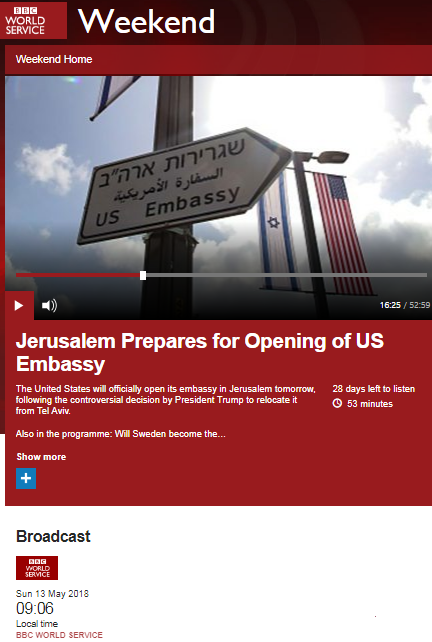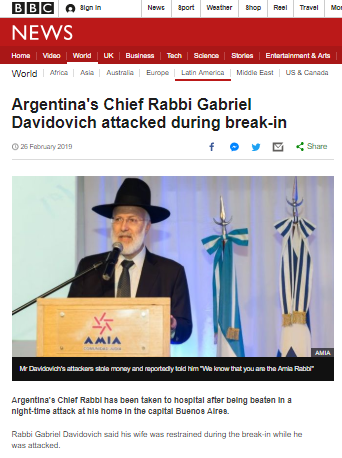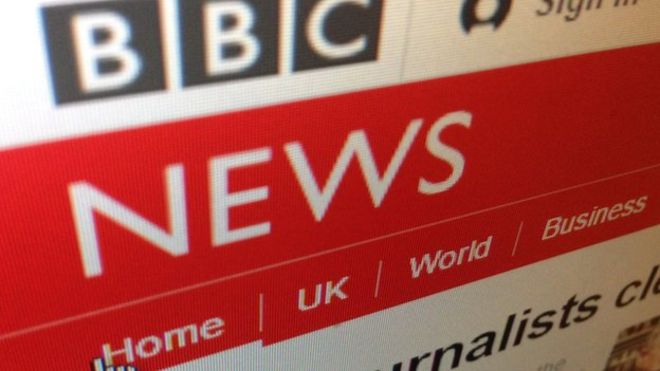The May 13th edition of the BBC World Service radio programme ‘Weekend‘ – presented by Julian Worricker – included a long item (from 04:38 here) relating to the next day’s opening of the new US embassy in Jerusalem. Given the BBC’s coverage of that story so far, it was hardly surprising to see that event once again portrayed as “controversial”.
“The United States will officially open its embassy in Jerusalem tomorrow, following the controversial decision by President Trump to relocate it from Tel Aviv.”
[emphasis in bold added, emphasis in italics in the original]
Worricker: “…we turn our attention to the Middle East and particularly the events of the next few days. Today it’s an Israeli national holiday commemorating the reunification of Jerusalem and the establishment of Israeli control over the Old City in the aftermath of the June 1967 Six Day War. The day is officially marked by state ceremonies and memorial services. Then tomorrow the American embassy is officially moved from Tel Aviv to Jerusalem. No country has its embassy in Jerusalem because of its contested status. Both Israelis and Palestinians see the ancient city as their capital. But in making the move President Trump is reversing seven decades of US policy and defying a long-standing international consensus.”
In fact, the US Congress of course voted to recognise Jerusalem as Israel’s capital over two decades ago. Worricker could have told listeners that Guatemala and Paraguay are in the process of moving their embassies to Jerusalem too but obviously that would have spoilt the chosen narrative of “international consensus”.
Worricker: “Indications of the controversy aroused come from, among others, Saeb Erekat – the chief negotiator for the Palestinian Liberation Organisation – who has asked fellow diplomats to boycott Monday’s event. And Israel says it will almost double the number of troops on its border with the Gaza Strip and in the occupied West Bank to deal with any wider Palestinian protests about the opening of the embassy.”
Worricker refrained from informing listeners that “protests” on the Gaza border were planned months ago and are billed as having an aim unrelated to the US embassy move: the breaching of that border and infiltration into Israel.
After promising “Israeli and Palestinian voices on this in a moment”, Worricker presented a recycled brief history of Jerusalem from British historian Simon Sebag Montefiore before introducing Gil Hoffman of the Jerusalem Post. Having asked him for his view on why the US embassy move matters, Worricker went on to promptly criticise his interviewee’s reply.
Worricker: “The problem with that view – as you know only too well – is that the Palestinians claim East Jerusalem, occupied since 1967, as the potential capital of its future state. So how do you square that circle?”
After Hoffman had pointed out that the US president said in his December 6th 2017 statement that the borders in Jerusalem are to be determined by the parties concerned and that Saeb Erekat – to whom Worricker had referred to earlier – had failed at his job of negotiating with Israel, Worricker found it necessary to both defend Erekat and promote the PLO position.
Worricker: “Well he [Erekat] would say obviously that if he has – to use your word – failed, it’s because the other side hasn’t done what he would require them to do by way of a compromise. Really, we’ve seen decades of US neutrality on this issue. How can it facilitate future negotiations if the US now – on this – favours one side so obviously over the other?”
In response to Hoffman stating that US neutrality had to date failed to resolve the issue, Worricker retorted:
Worricker: “Let me invite you to look at it from the other point of view in that case because going back to my neutrality point, if this is, quote – and this is a crude way of describing it – a big win for Israel, what do you offer to give back in return to those who are clearly angered by this, whether you think their anger is justified or not?”
As Hoffman began to respond by saying that Trump has a plan he’s been working on, Worricker interrupted him:
Worricker: “Mr Trump and Mr Netanyahu clearly are in agreement over this so the two are working to a degree hand in hand.”
Hoffman replied that the US peace plan will no doubt include Israeli concessions in Jerusalem before Worricker closed the interview.
Clearly that less than four-minute interview did not provide listeners with much understanding of “Israeli voices” because Worricker was too busy criticising Hoffman’s replies.
Worricker next went on to tell listeners that “the 70th anniversary of the creation of Israel” would take place on May 15th – while failing to note that the occasion was marked by Israel on April 19th.
Worricker: “I mentioned Palestinian voices as well. Well protests are expected at that embassy on Monday. It’s a sensitive time because it’s a day before the 70th anniversary of the creation of Israel but the day that Palestinians refer to as a Nakba – catastrophe. That is the day after that independence in 1948 when hundreds of thousands of Palestinians fled their homes or were displaced.”
Worricker next conducted an interview with a Palestinian film-maker called Azza el Hassan who made a film about PLO propaganda films from the 60s and 70s. At one point (13:09) during that five-minute conversation, Hassan said:
Hassan: “…you know what’s so beautiful about these films? In these films Palestinians are not victims. In fact they’re liberators; they’re going to change the world. They’re propaganda films but there is this nice, dreamy element in them which makes you think it’s a pity that all of this was lost somehow.”
Worricker: “You use the word propaganda, because I am bound to point out that during the 60s and 70s when the PLO – the Palestine Liberation Organisation – was a professedly violent organisation pursuing its aims by violent means – that’s not something to celebrate, is it?”
Hassan: “Well you have to remember that the 70s…you cannot read the 70s from what you’re reading today. The 70s was the period of the Cold War. For example the South African movement was also a military movement – the ANC I mean by that. So when you say that the PLO was into [inaudible] you’re absolutely right but so was all liberating movements at that time.”
Worricker: “Mmm…but it doesn’t justify some of the dreadful acts that were carried out at that time.”
Listeners then heard false claims regarding the ‘Great Return March’ in which the majority of those killed during violent rioting since the end of March – rather than “in the last week” – were shown to be linked to terror organisations. Worricker made no effort whatsoever to challenge those falsehoods.
Hassan: “Absolutely, but if you want to talk about violence now, now in the last week Israel have killed 50 innocent people in Gaza who were just protesting peacefully. So violence is…what’s important is what’s happening now.”
Worricker: “Well let’s talk about what’s happening now because clearly there is a reason for having this conversation beyond the film that you made. We’re going to see in the coming days the American embassy in Israel moving from Tel Aviv to Jerusalem. And we’re going to see the anniversary of the events of 1948 which led to the creation of the State of Israel, so Israelis will celebrate that. Palestinians will regard that as – to use their word – a catastrophe. In other words, the sides are so, so, so far apart. Do you see any hope of anything changing?”
Apparently Worricker is not aware of the fact that Israelis will not be celebrating “in the coming days” an event they have already marked. Listeners then heard promotion of elimination of the Jewish state.
Hassan: “I think there’s always hope. I think nothing will ever stay…nothing ever stays the same. Things have to move. And I believe in a one-state solution. I’ve always believed in it. And…”
Worricker: “One state rather than two?”
Hassan: “Yeah. I think…wouldn’t you want a one-state solution? Why would you want a two-state solution? But what needs to happen is you have to create a humane environment and an equal environment for everyone. And then we can move forward.”
Worricker: “When you look at the way the Palestinians – particularly those in charge, whether it’s in the West Bank or the Gaza Strip – the way they have tried to conduct the campaign that they have conducted in recent years, when you look at the failings and the shortcomings, what should they have done differently?”
Hassan: “As a Palestinian I feel we are in our worst point of history. We don’t even have a proper political position. So lots of shortcomings are appearing and I agree with you but I also find them a natural conclusion to an unnatural and unjust situation.”
Worricker closed that second and distinctly less confrontational interview at that point.
As we see listeners to this long item heard inaccurate claims concerning US policy on Jerusalem and Israel’s Independence Day celebrations. Audiences also heard inaccurate claims relating to the events on Israel’s border with the Gaza Strip and – as was the case in the very few reports produced when Israelis actually did celebrate the 70th anniversary of their country’s independence – promotion of the ‘Nakba’ and the campaign to eradicate the Jewish state known as the ‘one-state solution’ was also in evidence.
Related Articles:
BBC R4, WS mark Israeli independence with ‘nakba’ and ‘one-state’




